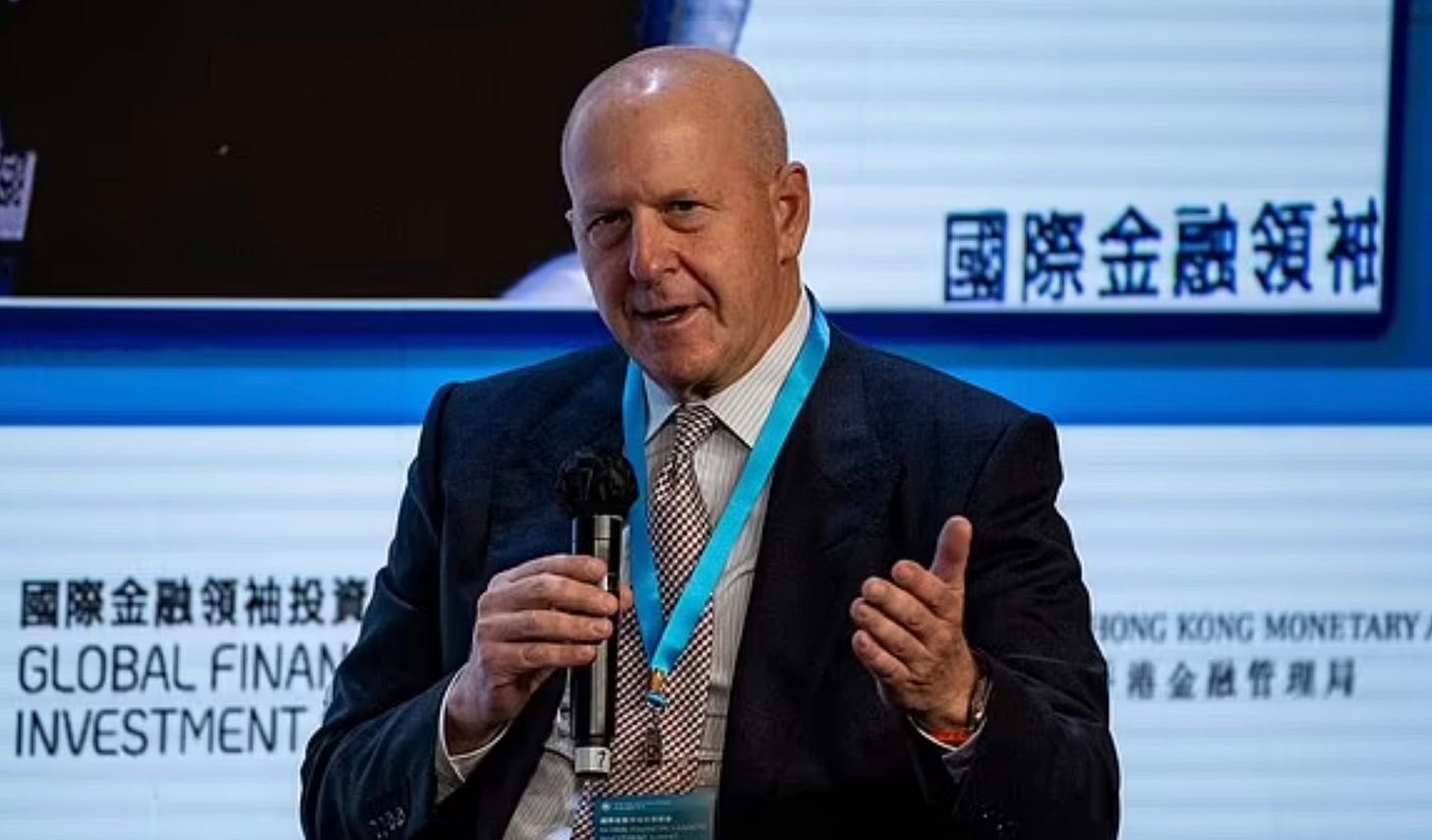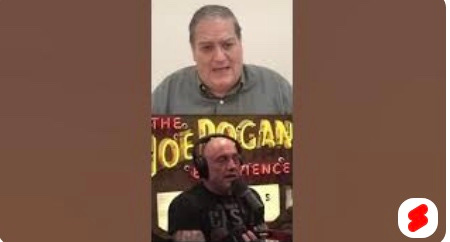Goldman Sachs Swoons for Kamala
Trump should nail tax-and-spend Kamala and elite bank in Thursday speech and remind people how he created Three Fat Years of economic growth before COVID
Goldman Sachs just volunteered to be a whipping boy for Donald Trump. He should take them up on the offer.
Ludicrously, the former cream of the crop of Wall Street—now just another corrupted institution—has asserted that the economy will be worse off under Donald Trump than Kamala Harris. It’s what one would expect from a New York investment bank helmed by a man, David Solomon, who toadied Chinese authorities in Hong Kong last year and apparently shared a stage with U.S.-sanctioned Hong Kong boss John Lee.
In a news article titled, “Goldman Sees US GDP Hit If Trump Wins, Boost If Democrats Sweep,” Bloomberg reported that the elite investment bank asserted in a research note that “the hit to growth from tariffs and tighter immigration policy would outweigh the positive fiscal impulse” from maintaining Trump tax levels.
Harris, on other hand, would usher in joy: “new spending and expanded middle-income tax credits would slightly more than offset lower investment due to higher corporate tax rates.”
Goldman downplayed the looming tax hikes, stating:
“Regardless of party control, expiring tax cuts will be the dominant fiscal issue in 2025. The individual tax cuts enacted in 2017 expire at the end of 2025, when taxes would rise by 1% of GDP if Congress does not act.”
Goldman hid the severity of the tax hike and the impact on its clients by casting it as a portion of GDP. In reality, absent action by Congress and a Republican president, after 2025 personal income taxes would increase as follows:
The second-lowest income bracket (those earning $11,001-$44,725) would rise from a 12% rate to a 15% rate
The bracket paying a 22% rate will rise to a 25% rate
The bracket paying a 24% rate will rise to a 28% rate
The top bracket paying a 37% rate will rise to a 39.6% rate
Considering the slew of other taxes Americans pay, ranging from sales and property taxes to Social Security and Medicare, to fees on airline tickets and hotel rooms, many Americans in their most productive years would pay more than half their income to the government. This would mark another shift of resources from the productive private sector (e.g., your supermarket) to the unproductive public sector (e.g., your DMV).
Also set to expire is the $10,000 federal cap on deducting state and local taxes—a deduction by which the federal government effectively encouraged states to have higher taxes and rewarded those that did. Once again, without action by Congress, rich investment bankers like those working at Goldman could deduct all of the taxes they pay to New York State and New York City while middle-class taxpayers in no-income-tax states like Florida, Tennessee, and Texas would get no deduction—effectively carrying more of the federal load.
Trump signed the law enacting lower brackets along with a healthy increase to the standard deduction that freed a major portion of taxpayers from itemizing their tax returns in 2017. Under stupid congressional rules related to actions that supposedly would increase the deficit, the cuts needed to have an expiration date.
By the liberal telling, these Trump cuts “cost” the government trillions of dollars and helped run up the deficit. In reality, federal revenue increased after the cuts thanks to improved private-sector activity. Federal revenue in Fiscal Year 2017 before the cuts took effect was $3.316 trillion. In 2018, it increased to $3.330 trillion. In 2019, it increased again to $3.463 trillion. It dipped only slightly during the pandemic year of 2020 to $3.421 trillion before rebounding strongly to $4.407 the following year.
As with tax cuts enacted in the Kennedy and Reagan administrations, federal revenue increased promptly following the Trump cuts. This is a lesson that progressives and Keynesians like those at Goldman refuse to learn because it conflicts with their theology of more taxes and more government.
Harris, Goldman, and much of the rest of Wall Street are committed to this theology and would wreck the economy and stock market—the opposite of Goldman’s conclusion. Harris need only take no action for income taxes to rise. She also wants to raise corporate taxes and favors a tax on unrealized capital gains—of course using the California trick of saying the tax will apply only to the rich but then inevitably extending it to the middle class. Investment capital won’t wait around for that to happen and will exit the United States for happier pastures rapidly.
A Trump victory, on the other hand, would likely bring a Republican Congress along with it. Together they could extent the current tax levels and even make additional cuts. This could pave the way for desperately needed additional federal revenue since the Biden-Harris administration has now managed to enshrine annual budget deficits of nearly $2 trillion and total debt held by the public of $28 trillion (excluding intragovernmental IOUs that will never be repaid), even with the lack of a national emergency.
While neither candidate has talked much about cuts to out-of-control federal spending, at least it is a possibility with Trump. Under Biden, higher spending around the $7 trillion mark is set to continue and increase forever. Before the pandemic hit, the Trump level in Fiscal Year 2019 was $4.4 trillion.
Before voters lay two stark choices: the current tax levels with some cuts possible under Trump and a return to the prosperity of Trump’s Three Fat Years of economic growth before COVID, or Harris’s Californiaization of the economy and government where the government takes ever more, the economy stagnates, and only the elite who can arrange exotic deductions and loopholes are better off.
On Thursday, Trump will speak to the Economic Club of New York and lay out his plan for prosperity and getting off the path of bankrupting America with huge deficits. He should attack the elite at Goldman head on and remind people that he already proved that fewer taxes on the productive sector leads to a better economy and healthier federal budget.
Trump is for main street, not Wall Street. The more he makes that clear to voters, the more he is likely to win.
Domino Theory
Some noteworthy short clips from our latest episode of the Domino Theory podcast.
Steve Yates on China’s fentanyl war on the USA, which claimed his daughter’s life.
Mark Simon on why many people trust comedians more than some journalists
Christian’s opening monologue on why Harris’s remain-in-basement strategy with the media might not work out for her.






